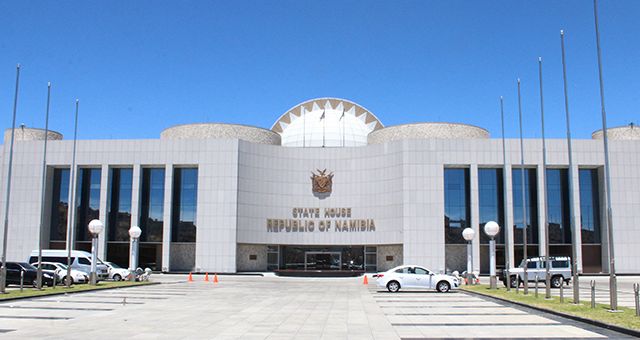Hardly ever do we connect the dots between HIV-AIDS and human rights!
But the fact remains, that the world over, people living with HIV are being discriminated against simply on the grounds of their health status.In fact, right here in Namibia, a case is pending in the courts, in which 15 HIV-positive women are taking the Ministry of Health and Social Services to task, claiming that they were sterilised against their wishes, and on the grounds of their HIV status.The AIDS and Rights Alliance of Southern Africa (ARASA) has been one of seven organisations at the forefront of speaking out against the violations of human rights carried out against these women, and last week held a march to the High Court, where the cases will be heard, demanding that Government immediately cease the practice targeting HIV-positive women.And at the head of ARASA is the dynamic director and co-founder of the organisation, Michaela Clayton.Clayton has held a keen interest in human rights work since her student days at the University of Cape Town where she was heavily involved in the student movement, right through to today.Born in England and having grown up in South Africa, Clayton came to Namibia in 1988 to join Andrew Corbett and Dave Smuts, who had just started up the Legal Assistance Centre.There, she underwent what she calls ‘a baptism of fire as far as human rights is concerned’ as the Centre hit the ground running, dealing mostly with cases for people who had been detained and tortured in detention as a result of the South African security legislation of that time.In 1989, during a time when Namibia was only starting to get to know and face HIV and AIDS, Clayton’s interest in HIV and Human Rights piqued when she was invited to give a talk at the State Hospital on the subject.She never looked back after that. In 1992, she helped to set up the AIDS Care Trust, soon thereafter setting up the AIDS Law Unit at the LAC. The Unit does a great deal of work in national HIV and AIDS policy, and in fact developed the AIDS Charter, which formed the basis of Namibia’s HIV and AIDS response.In 2002, together with Mark Heywood of the Aids Law Project and others, Clayton co-founded the AIDS and Rights Alliance of Southern Africa (ARASA) to create a network of organisations working on HIV and human rights in Southern Africa. Today, ARASA boasts a network of over 45 HIV and Rights organisations across the region, and carries out programmes in training and capacity building, HIV and human rights advocacy, and treatment literacy, as well as a number of campaigns.Just recently, Clayton was awarded the 2009 International Award for Action on HIV-AIDS and Human Rights from the Canadian HIV-AIDS Legal Network and Human Rights Watch.The Namibian’s Nangula Shejavali last week caught up with Clayton to talk about her many years of service in fighting for human rights, the state of human rights in Namibia, and the need for a new generation of activists.Nangula Shejavali (NS): Michaela, congratulations on your award. What does this mean for you and for ARASA?Michaela Clayton (MC): Thank you. Personally I was very honoured to receive this award, but as I said when I received it, its not about me. I wasn’t receiving it on my own behalf, but on the behalf of hundreds of others that I’ve been working with throughout the years to create a human-rights based response to HIV and AIDS. The work we’ve carried out hasn’t come through my own efforts, but with several other brave and committed people. And I also received it on behalf of my daughter.NS: You’ve been very busy on a number of campaigns, and recently made some big news with the march and activities around the campaign against the forced sterilisation of women living with HIV here in Namibia. What is the gist of ARASA’s campaign work throughout the region?MC: Our primary campaign at the moment is centred around challenging the spread of HIV laws. One of the strange things about them is that they are being pushed for mainly by women’s groups – possibly out of frustration – but at the end of the day, the practical result is that women are going to be the first ones prosecuted for the transmission of HIV and AIDS, as they usually are the first to know their status.With the support of the LAC and ICW, we’ve also been carrying out advocacy campaigns in terms of sexual and reproductive health, as with the campaign to address sterilisation without consent.And we currently also have an ongoing campaign on financing for health, called ‘The Lords of Bling’, which is about how African leaders spend their money on things like birthday parties and cars and jets, and what that money means in terms of the cost of treatment that could’ve been bought (see picture insert).And though we operate at a regional level, we also engage a lot of international organisations in different forums. NS: How would you describe the human rights climate in the region at the moment?MC: It’s going backwards. It’s so disturbing. It’s like one step forward and 10 steps backward. We keep seeing the horrible, repressive side of governments sticking their head up, ranging from things like this communication bill, to this horrible bill against homosexuality being tabled in Uganda, with such broadly defined statements that if passed, it would allow government to shut down NGOs and media houses that in any way talked about homosexuality. So there’s that kind of moralistic repressive legislation that’s popping up in countries in different parts of the world.NS: What does this mean for your work?MC: Well, it means that we have to work even harder. And clearly, I guess it also means that we’ll never be out of a job. Much as we’d like to work ourselves out of a job, its just not going to happen. I really find it extremely disturbing that there’s been such a backslide, and personally, having worked at the LAC before Independence, and watching liberation happen, and watching what’s happened subsequently, I find it incredibly depressing. It’s almost like governments have learned from colonial government how to be repressive in many ways. You know, you’re fighting for liberation and justice and equality and you look how many years down the line and what do we see?NS: And what would you say are the impediments to ensuring a better human rights climate in the region?MC: Definitely the gap between policy and implementation. This is a huge problem across the board. Also, there is the high level of stigma and discrimination at the community level.The thing that’s shocking is that we’ll have these workshops, and as we’re going through the basics of what are human rights, and who has human rights, and we’ll have people, some of whom proclaim themselves to be human rights activists, saying things like ‘everybody has human rights unless they are gay, or a drug worker, sex workers, and so on’. But the point is that everyone has human rights… it’s not some kind of favour granted to you by the state. And this imposition on who has human rights based on people’s own moral judgements really stands in the way of an effective response to HIV.And there’s also the issue in a number of countries where we’ve seen a series of punitive laws criminalising sex work and homosexuality, for example. But contrary to what leaders believe, these laws impede an effective response to HIV and AIDS. And from the perspective of women, there are still a lot of cultural attitudes that present problems in negotiating safe sex, accessing treatment and care, and so on.NS: With these types of ‘impositions’ on human rights taking place, do you believe that there’s enough education going on about HIV-AIDS, and human rights in general? MC: No. But there is a need to start early. We need to start working with kids at a young age to give age-appropriate information about relationships, about sex, and about HIV. But I think also more importantly about male-female relationships and gender equality, and to change kids’ attitudes from that age, that a woman’s place is not necessarily barefoot, pregnant and in the kitchen… you know, to change people’s perceptions about gender norms.
Because particularly in our part of the world, where the epidemic is largely a generalised epidemic and women are most affected, we’re not going to be effective in our response until we change the way that society thinks about women, and until we change the way women think about themselves.This horrendous case about sterilisation, which is not only happening in Namibia by the way, also has to do with doctor-patient relationships where doctors don’t consult with their patients, and where the right to privacy and bodily integrity is often just not respected. For example, blood is taken, a test is done, and so on, but patients are supposed to have the right to decide whether or not they want to be tested. So what’s in policy in terms of consultation between doctor and patient just isn’t happening in practice. So in terms of education, healthcare workers also need to be more informed. With the establishment of a Namibian school of medicine next year, I would like to see a component on Human Rights in Healthcare being taught.NS: What else remains to be done in reaching the level we need to be at with regards to HIV and human rights?MC: If we look at some of the statements that are still being made, its clear that there is a need to go back to the basics to address these preconceived notions held by too many people, about who has human rights and who doesn’t. The fact of the matter is that everyone has human rights.As communities, we also need to work harder to make our governments accountable. Namibia has done quite well in rolling out treatment and meeting its targets, but even though ARVs are available, there are still a lot of issues with regards to accessing treatment. We need to work harder to link health and rights, and high standards won’t be delivered unless human rights are protected.NS: You spoke about communities making government accountable. Do you think civil society is doing enough to speak out on human rights issues?MC: Not at all. Civil society in Namibia seems to have died since Independence. People just sit back and accept bad service and non-performance, and very little activism takes place any more. It’s very worrying. There seems to have been a slowdown in the level of community involvement, even though we have seen how effective advocacy from civil society organisations can change laws.NS: Your message?MC: Well, one worrying trend we’re seeing is that very few young people are going into human rights work. If there’s any message at all, it would be to the younger generation to really consider getting involved in human rights work, and not just going into the corporate world. There’s still a lot of work to be done, and this decreasing social consciousness among younger Namibians is really worrying. We’re not seeing the same level of social activism as previously, and there’s a very small grouping of people involved in social and rights issues. There’s a serious need for a new generation of human rights activists in Namibia.nangula@namibian.com.na
Stay informed with The Namibian – your source for credible journalism. Get in-depth reporting and opinions for
only N$85 a month. Invest in journalism, invest in democracy –
Subscribe Now!










